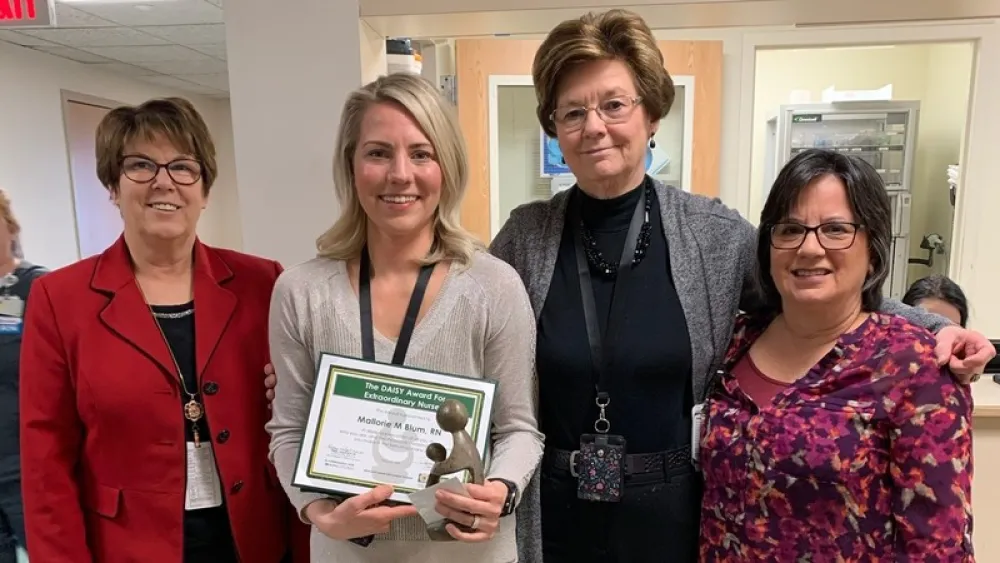Inspiring Stories
'Mallorie Saved My Son's Life': Jennie Edmundson Nurse Honored for Work in Behavioral Health Unit
Published: Feb. 25, 2020

Working in the behavioral health unit at Methodist Jennie Edmundson Hospital, Mallorie Blum, RN, sees people at what are often the lowest points of their lives.
“Be nice. That’s my whole philosophy,” said Blum, the unit’s clinical assessment coordinator. “Every single person in this world has someone in their family who at one point or another has or will need psychiatric treatment. So if it were my family member, how would I want them to be treated?”
Tragedy Drives Her to Help Others
Blum’s philosophy springs from experience. When she was 14, a relative’s suicide changed her life.
“It destroyed a lot of pieces of my family,” she said, but it also inspired her to help others.
She studied nursing at the College of Saint Mary and has been a psychiatric nurse at Jennie Edmundson for 13 years.
“This was the way to feel like you were making a difference,” she said.
For the past year, she’s worked as the behavioral health unit’s clinical assessment coordinator, meeting individually with patients and helping determine if they need Jennie Edmundson’s psychiatric services.
For the self-described people person, that one-on-one time is the best part of the job.
“It’s just me and them for as long as they need, and their family can be there,” Blum said. “I’m easing their families’ fears and theirs.”
A Mother’s Thanks
Blum’s dedication to patients hasn’t gone unnoticed. She was recently honored as the first DAISY Award recipient at Jennie Edmundson for the lifesaving difference she made for a young man at the hospital.
His grateful mother nominated Blum for the award and shared the family’s story:
“I received a phone call from my son asking for help. He had attempted suicide earlier in the week and stopped at the time. But if he did not get help immediately, he would attempt again because he needed the pain to go away. After checking in at the hospital and being shown to a room, he was visited by several hospital personnel, including the psychiatric nurse on duty, Mallorie Blum. As with every person who came in, she introduced herself, had him verify his information and asked him a long list of questions pertaining to his medical history, symptoms, feelings, etc. Where Mallorie set herself apart from any medical professional I have ever came into contact with was after she completed her tasks, she asked if she could tell him a story. Mallorie told us the story of why she became a psychiatric nurse and how she knew that would be her career at age 14. She gave him some statistics regarding the number of suicides by teenagers due to feeling there are no other options. When Mallorie was finished, she apologized for her ‘soap box’ and told my son that he was young and handsome, and he had a bright future. She explained what inpatient treatment would entail and asked if he would admit himself to get help and tools to deal with the pain. He agreed. He credits Mallorie with saving his life. He states that she made him think and understand how his actions would affect those who love him. Mallorie saved my son’s life with her openness to share her story, her frankness for telling him like it is, for painting the true picture for him about suicide and for taking extra time with him and myself during our time of need. I can’t thank her enough. She is a gem.”
The mother went on to write: “I have shared my personal experience and Mallorie’s openness to talk with my son with other friends and family. I believe that Mallorie’s ability to share her story enabled my family to speak openly about his condition at the time. I have encouraged people to spread the word about the wonderful care he received while he was at Jennie. I truly believe Mallorie is an angel disguised in a nurse’s uniform. My hope is that when others are in need of help, they will get the opportunity to meet her.”
Lifesaving Message
Blum said she was honored to receive The DAISY Award, but the good that came from the young man’s experience outweighs any accolade.
Potentially saving a life “makes me feel so wonderful,” she said. And the family’s experience may have started a ripple effect where more people feel comfortable discussing mental health challenges and seeking help.
“It’s great for people to know this is a safe place to come and that we have caring individuals here that will help you,” Blum said. “It gives people hope that there is somewhere that they can go.”
More Resources
- Learn more about behavioral health services at Methodist
- Nominate a Methodist nurse for The DAISY Award
- Read more inspiring stories of Methodist patients and staff
- Get similar stories delivered straight to your inbox


